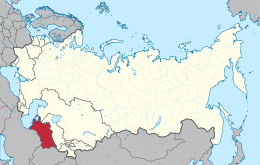Turkmen Soviet Socialist Republic (1925–1991): Difference between revisions
No edit summary |
No edit summary Tag: Visual edit |
||
| Line 1: | Line 1: | ||
{{Infobox country|name=Turkmen Soviet Socialist Republic|native_name=Түркменистан Совет Социалистик Республикасы<br>Туркменская Советская Социалистическая Республика|image_flag=Flag_of_the_Turkmen_Soviet_Socialist_Republic_(1973–1991).svg|image_coat=Emblem_of_the_Turkmen_SSR.svg|capital=Ashgabat|mode_of_production=[[Socialism]]|government_type=[[Marxist–Leninist]] [[socialist state]]|flag_caption=Flag (1973–1991)|area_km2=491,210}} | {{Infobox country|name=Turkmen Soviet Socialist Republic|native_name=Түркменистан Совет Социалистик Республикасы<br>Туркменская Советская Социалистическая Республика|image_flag=Flag_of_the_Turkmen_Soviet_Socialist_Republic_(1973–1991).svg|image_coat=Emblem_of_the_Turkmen_SSR.svg|capital=Ashgabat|mode_of_production=[[Socialism]]|government_type=[[Marxist–Leninist]] [[socialist state]]|flag_caption=Flag (1973–1991)|image_map=Turkmen SSR map.svg|map_width=260|area_km2=491,210}} | ||
The '''Turkmen Soviet Socialist Republic''' was a republic of the [[Union of Soviet Socialist Republics (1922–1991)|Soviet Union]] in [[Central Asia]]. | The '''Turkmen Soviet Socialist Republic''' was a republic of the [[Union of Soviet Socialist Republics (1922–1991)|Soviet Union]] in [[Central Asia]]. | ||
== | == Economy == | ||
== | === Agriculture === | ||
From 1924 to 1940, the cotton yield of Turkmenistan increased by 450% and the yield per acre nearly doubled.<ref name=":0">{{Citation|author=W. P., Zelda K. Coates|year=1940|title=Russia, Finland and the Baltic|chapter=Introduction|pdf=https://ia600104.us.archive.org/2/items/RussiaFinlandBalticsCoates/Russia%20Finland%20Baltics%20Coates.pdf|city=London, [[England]]|publisher=Lawrence & Wishart Ltd.}}</ref> The percentage of the population working in agriculture dropped from 59.1% in 1939 to 48.6% in 1959.<ref name=":02">{{Citation|author=Albert Szymanski|year=1984|title=Human Rights in the Soviet Union|chapter=The Asian Nationalities in the USSR|page=39–57|pdf=https://cloudflare-ipfs.com/ipfs/bafykbzaceazdmtb2y3qq27fve5ib3gk7uv2unt6ae2xss74xmfpur7k5uhl5m?filename=Albert%20Szymanski%20-%20Human%20Rights%20in%20the%20Soviet%20Union_%20Including%20Comparisons%20with%20the%20U.S.A.-Zed%20Books%20Ltd.%20%281984%29.pdf|city=London|publisher=Zed Books Ltd.|isbn=0862320186|lg=https://libgen.rs/book/index.php?md5=C597B1232D9EA6B0F3DCB438D7E15A81}}</ref> | |||
In 1940, there were 1,347 schools in Turkmenistan, most of which were in rural areas. In addition, there were four universities, 38 technical colleges, and 18 scientific research institutes.<ref name=":0" /> | === Industry === | ||
Industrial output in Turkmenistan increased by 74 times from 1913 to 1978. The percentage of the Turkmen population working in industry, transportation, and construction rose from 20.3% to 26.7% from 1939 to 1959.<ref name=":02" /> | |||
== Living standards == | |||
=== Education === | |||
In 1940, there were 1,347 schools in Turkmenistan, most of which were in rural areas. In addition, there were four universities, 38 technical colleges, and 18 scientific research institutes.<ref name=":0" /> The number of students of all levels in the Turkmen SSR increased by over 90 times following the revolution.<ref name=":02" /> | |||
==== Literacy ==== | |||
Before the [[October Revolution]], less than 1% of the Turkmen population was literate.<ref name=":0" /> The literacy rate rose to 14% in 1926,<ref name=":02" /> 80% in 1940,<ref name=":0" /> and 95.4% in 1959.<ref name=":02" /> | |||
In 1970, 65% of books and 70% of newspapers published in Turkmenistan were in the Turkmen language.<ref name=":02" /> | |||
=== Health care === | |||
In 1971, Turkmenistan had fewer doctors and hospital beds per capita than the all-USSR average, although there were more doctors per adult.<ref name=":02" /> | |||
== Demographics == | |||
The proportion of Turkmens in the TSSR rose from 60.9% in 1959 to 68.4% in 1979. The amount of [[Russian Soviet Federative Socialist Republic (1917–1991)|Russians]] dropped from 14.5% to 12.6% between 1970 and 1979.<ref name=":02" /> | |||
== References == | == References == | ||
[[Category:Republics of the Soviet Union]] | [[Category:Republics of the Soviet Union]] | ||
Latest revision as of 16:51, 12 February 2023
| Turkmen Soviet Socialist Republic Түркменистан Совет Социалистик Республикасы Туркменская Советская Социалистическая Республика | |
|---|---|
 | |
| Capital | Ashgabat |
| Dominant mode of production | Socialism |
| Government | Marxist–Leninist socialist state |
| Area | |
• Total | 491,210 km² |
The Turkmen Soviet Socialist Republic was a republic of the Soviet Union in Central Asia.
Economy
Agriculture
From 1924 to 1940, the cotton yield of Turkmenistan increased by 450% and the yield per acre nearly doubled.[1] The percentage of the population working in agriculture dropped from 59.1% in 1939 to 48.6% in 1959.[2]
Industry
Industrial output in Turkmenistan increased by 74 times from 1913 to 1978. The percentage of the Turkmen population working in industry, transportation, and construction rose from 20.3% to 26.7% from 1939 to 1959.[2]
Living standards
Education
In 1940, there were 1,347 schools in Turkmenistan, most of which were in rural areas. In addition, there were four universities, 38 technical colleges, and 18 scientific research institutes.[1] The number of students of all levels in the Turkmen SSR increased by over 90 times following the revolution.[2]
Literacy
Before the October Revolution, less than 1% of the Turkmen population was literate.[1] The literacy rate rose to 14% in 1926,[2] 80% in 1940,[1] and 95.4% in 1959.[2]
In 1970, 65% of books and 70% of newspapers published in Turkmenistan were in the Turkmen language.[2]
Health care
In 1971, Turkmenistan had fewer doctors and hospital beds per capita than the all-USSR average, although there were more doctors per adult.[2]
Demographics
The proportion of Turkmens in the TSSR rose from 60.9% in 1959 to 68.4% in 1979. The amount of Russians dropped from 14.5% to 12.6% between 1970 and 1979.[2]
References
- ↑ 1.0 1.1 1.2 1.3 W. P., Zelda K. Coates (1940). Russia, Finland and the Baltic: 'Introduction'. [PDF] London, England: Lawrence & Wishart Ltd..
- ↑ 2.0 2.1 2.2 2.3 2.4 2.5 2.6 2.7 Albert Szymanski (1984). Human Rights in the Soviet Union: 'The Asian Nationalities in the USSR' (pp. 39–57). [PDF] London: Zed Books Ltd.. ISBN 0862320186 [LG]

